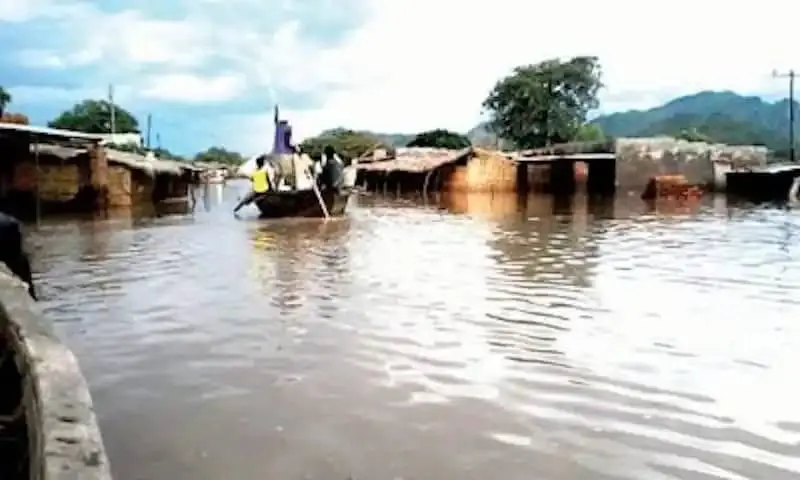Kebbi State, located in northwest Nigeria, is currently reeling from the impact of one of the most devastating floods in its history. Over the past few weeks, torrential rains have caused widespread flooding across the region, claiming 29 lives and destroying more than 321,000 homes. Thousands of residents are now displaced, struggling to cope with the aftermath of this disaster.
In addition to the tragic loss of life and homes, the flood has submerged an astounding 858,000 hectares of farmland. Kebbi is a major agricultural hub, known for its rice production and other essential crops like millet, sorghum, and beans. The floodwaters have wiped out vast areas of these crops, threatening food security not only in the state but also across Nigeria, as Kebbi is a key supplier of food.
Local farmers are now facing financial ruin. Many have lost everything—their homes, their crops, and their means of livelihood. The Commissioner for Information and Culture, Yakubu Birnin Kebbi, has raised serious concerns about the looming food crisis, stating, “Many farmers have been pushed into poverty, and food shortages are on the horizon. The disaster has put our food security goals at risk unless immediate measures are taken to support recovery efforts.”
The Kebbi State government, led by Governor Nasir, has been working tirelessly to support those affected. However, the scope of the disaster has overwhelmed local resources. Yakubu Birnin Kebbi mentioned that although the state government has provided aid to displaced residents, the situation demands additional help from the federal government and international relief agencies.
The state has compiled a report on the flood’s extensive damage, which will be submitted to federal agencies to request more assistance. The commissioner emphasized the urgent need for financial support, stating that the flood’s magnitude is far beyond what the local government can handle on its own.
The destruction of 858,000 hectares of farmland is a massive blow to the state’s agricultural sector. To help farmers recover and return to cultivation, the state government has pledged to provide improved seeds and other agricultural inputs. However, even with this support, it may take a significant amount of time for farmers to rebuild their livelihoods and for the food supply to stabilize.
“More needs to be done,” the commissioner stated. “The loss of farmland could lead to long-term food shortages if we do not act quickly. We need a coordinated effort to restore farming activities as soon as possible.”
The human toll of the disaster has been deeply felt throughout Kebbi State. Initial reports confirm that the following areas have experienced significant loss of life:
- Ngaski: 7 deaths
- Maiyama: 8 deaths
- Kalgo: 5 deaths
- Jega: 7 deaths
- Birnin Kebbi: 2 deaths
These numbers are expected to rise as rescue and recovery efforts continue. In addition to the loss of life, the destruction of homes has left many families homeless, with shelters and temporary camps set up for displaced residents.
The state government is also facing challenges with accessing federal aid for flood mitigation. When asked whether the state had received the N3 billion grant from the Federal Government to assist with flood relief efforts, the commissioner revealed that he was uncertain if the funds had been disbursed. This uncertainty has made it difficult for the state to plan and execute large-scale recovery efforts.
Another pressing concern is the safety of residents still living in flood-prone areas. Despite warnings, some residents have refused to evacuate, preferring to stay in their homes rather than relocate to safer regions. The government has indicated that it may be forced to take more drastic measures, including forced evacuations, to prevent further casualties.
In the wake of the disaster, the Kebbi State government is calling for more support from the Federal Government, national agencies, and international organizations. The commissioner also expressed disappointment that representatives from Kebbi in the National Assembly, including Senators, have yet to visit the flood-affected areas to offer assistance or show solidarity with the victims.
Kebbi State is facing an enormous challenge in the coming months. The combined effects of the loss of life, destruction of homes, and the potential food crisis have put the region in a state of emergency. The state government is urging quick and coordinated action to ensure that the people of Kebbi can recover and rebuild their lives.
As the floodwaters recede, the full extent of the damage will become more apparent. Efforts are now focused on providing immediate relief to those displaced and ensuring that farmers can resume planting as soon as possible. The state government is working closely with federal agencies to secure additional funding and support.
For the thousands of residents affected by this disaster, the road to recovery will be long and difficult. However, with the right assistance and swift action, there is hope that Kebbi State can recover from this tragedy.
The devastating flood in Kebbi State has not only claimed lives but also severely disrupted the livelihoods of thousands of people. As local and federal governments work to provide relief and mitigate future risks, it is crucial for national and international support to flow into the region. Without urgent intervention, the consequences of this disaster could extend far beyond Kebbi, affecting food supplies and economic stability across Nigeria.







